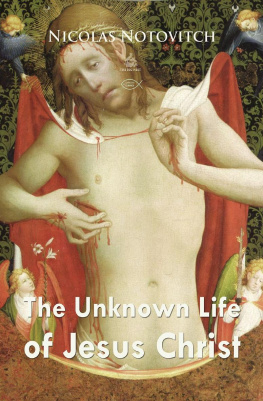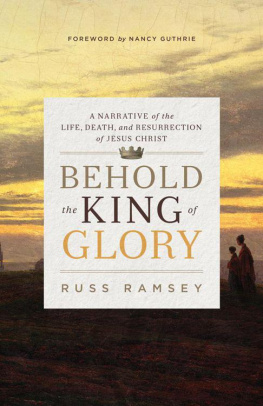Nicolas Notovitch - The Unknown Life of Jesus Christ (Christian Classics)
Here you can read online Nicolas Notovitch - The Unknown Life of Jesus Christ (Christian Classics) full text of the book (entire story) in english for free. Download pdf and epub, get meaning, cover and reviews about this ebook. year: 2016, publisher: The Big Nest, genre: Detective and thriller. Description of the work, (preface) as well as reviews are available. Best literature library LitArk.com created for fans of good reading and offers a wide selection of genres:
Romance novel
Science fiction
Adventure
Detective
Science
History
Home and family
Prose
Art
Politics
Computer
Non-fiction
Religion
Business
Children
Humor
Choose a favorite category and find really read worthwhile books. Enjoy immersion in the world of imagination, feel the emotions of the characters or learn something new for yourself, make an fascinating discovery.
- Book:The Unknown Life of Jesus Christ (Christian Classics)
- Author:
- Publisher:The Big Nest
- Genre:
- Year:2016
- Rating:3 / 5
- Favourites:Add to favourites
- Your mark:
- 60
- 1
- 2
- 3
- 4
- 5
The Unknown Life of Jesus Christ (Christian Classics): summary, description and annotation
We offer to read an annotation, description, summary or preface (depends on what the author of the book "The Unknown Life of Jesus Christ (Christian Classics)" wrote himself). If you haven't found the necessary information about the book — write in the comments, we will try to find it.
The Unknown Life of Jesus Christ (Christian Classics) — read online for free the complete book (whole text) full work
Below is the text of the book, divided by pages. System saving the place of the last page read, allows you to conveniently read the book "The Unknown Life of Jesus Christ (Christian Classics)" online for free, without having to search again every time where you left off. Put a bookmark, and you can go to the page where you finished reading at any time.
Font size:
Interval:
Bookmark:
Preface
After the Turkish War (1877-1878) I made a series of travels in the Orient. From the little remarkable Balkan peninsula, I went across the Caucasus to Central Asia and Persia, and, finally, in 1887, visited India, an admirable country which had attracted me from my earliest childhood. My purpose in this journey was to study and know, at home, the peoples who inhabit India and their customs, the grand and mysterious archology, and the colossal and majestic nature of their country. Wandering about without fixed plans, from one place to another, I came to mountainous Afghanistan, whence I regained India by way of the picturesque passes of Bolan and Guerna. Then, going up the Indus to Raval Pindi, I ran over the Pendjab--the land of the five rivers; visited the Golden Temple of Amritsa--the tomb of the King of Pendjab, Randjid Singh, near Lahore; and turned toward Kachmyr, The Valley of Eternal Bliss. Thence I directed my peregrinations as my curiosity impelled me, until I arrived in Ladak, whence I intended returning to Russia by way of Karakoroum and Chinese Turkestan.
One day, while visiting a Bhuddist convent on my route, I learned from a chief lama, that there existed in the archives of Lhassa, very ancient memoirs relating to the life of Jesus Christ and the occidental nations, and that certain great monasteries possessed old copies and translations of those chronicles.
As it was little probable that I should make another journey into this country, I resolved to put off my return to Europe until a later date, and, cost what it might, either find those copies in the great convents or go to Lhassa--a journey which is far from being so dangerous and difficult as is generally supposed, involving only such perils as I was already accustomed to, and which would not make me hesitate at attempting it.
During my sojourn at Leh, capital of Ladak, I visited the great convent Himis, situated near the city, the chief lama of which informed me that their monastic library contained copies of the manuscripts in question. In order that I might not awaken the suspicions of the authorities concerning the object of my visit to the cloister, and to evade obstacles which might be opposed to me as a Russian, prosecuting further my journey in Thibet, I gave out upon my return to Leh that I would depart for India, and so left the capital of Ladak. An unfortunate fall, causing the breaking of a leg, furnished me with an absolutely unexpected pretext for returning to the monastery, where I received surgical attention. I took advantage of my short sojourn among the lamas to obtain the consent of their chief that they should bring to me, from their library, the manuscripts relating to Jesus Christ, and, assisted by my interpreter, who translated for me the Thibetan language, transferred carefully to my note-book what the lama read to mc.
Not doubting at all the authenticity of this Preface, chronicle, edited with great exactitude by the Brahminic, and more especially the Buddhistic historians of India and Nepaul, I desired, upon my return to Europe, to publish a translation of it.
To this end, I addressed myself to several universally known ecclesiastics, asking them to revise my notes and tell me what they thought of them.
Mgr. Platon, the celebrated metropolitan of Kiew, thought that my discovery was of great importance. Nevertheless, he sought to dissuade me from publishing the memoirs, believing that their publication could only hurt me. Why? This the venerable prelate refused to tell me more explicitly. Nevertheless, since our conversation took place in Russia, where the censor would have put his veto upon such a work, I made up my mind to wait.
A year later, I found myself in Rome. I showed my manuscript to a cardinal very near to the Holy Father, who answered me literally in these words:--What good will it do to print this? Nobody will attach to it any great importance and you will create a number of enemies. But, you are still very young! If it is a question of money which concerns you, I can ask for you a reward for your notes, a sum which will repay your expenditures and recompense you for your loss of time. Of course, I refused.
In Paris I spoke of my project to Cardinal Rotelli, whose acquaintance I had made in Constantinople. He, too, was opposed to having my work printed, under the pretext that it would be premature. The church, he added, suffers already too much from the new current of atheistic ideas, and you will but give a new food to the calumniators and detractors of the evangelical doctrine. I tell you this in the interest of all the Christian churches.
Then I went to see M. Jules Simon. He found my matter very interesting and advised me to ask the opinion of M. Renan, as to the best way of publishing these memoirs. The next day I was seated in the cabinet of the great philosopher. At the close of our conversation, M. Renan proposed that I should confide to him the memoirs in question, so that he might make to the Academy a report upon the discovery.
This proposition, as may be easily understood, was very alluring and flattering to my amour propre. I, however, took away with me the manuscript, under the pretext of further revising it. I foresaw that if I accepted the proposed combination, I would only have the honor of having found the chronicles, while the illustrious author of the Life of Jesus would have the glory of the publication and the commenting upon it. I thought myself sufficiently prepared to publish the translation of the chronicles, accompanying them with my notes, and, therefore, did not accept the very gracious offer he made to me. But, that I might not wound the susceptibility of the great master, for whom I felt a profound respect, I made up my mind to delay publication until after his death, a fatality which could not be far off, if I might judge from the apparent general weakness of M. Renan. A short time after M. Renans death, I wrote to M. Jules Simon again for his advice. He answered me, that it was my affair to judge of the opportunity for making the memoirs public.
I therefore put my notes in order and now publish them, reserving the right to substantiate the authenticity of these chronicles. In my commentaries I proffer the arguments which must convince us of the sincerity and good faith of the Buddhist compilers. I wish to add that before criticising my communication, the societies of savans can, without much expense, equip a scientific expedition having for its mission the study of those manuscripts in the place where I discovered them, and so may easily verify their historic value.
NICOLAS NOTOVITCH.
01. A Journey in Thibet
During my sojourn in India, I often had occasion to converse with the Buddhists, and the accounts they gave me of Thibet excited my curiosity to such an extent that I resolved to make a journey into that still almost unknown country. For this purpose I set out upon a route crossing Kachmyr (Cashmere), which I had long intended to visit.
On the 14th of October, 1887, I entered a railway car crowded with soldiers, and went from Lahore to Raval-Pindi, where I arrived the next day, near noon. After resting a little and inspecting the city, to which the permanent garrison gives the aspect of a military camp, I provided myself with the necessaries for a journey, where horses take the place of the railway cars. Assisted by my servant, a colored man of Pondichery, I packed all my baggage, hired a tonga (a two-wheeled vehicle which is drawn by two horses), stowed myself upon its back seat, and set out upon the picturesque road leading to Kachmyr, an excellent highway, upon which we travelled rapidly. We had to use no little skill in making our way through the ranks of a military caravan--its baggage carried upon camels--which was part of a detachment returning from a country camp to the city. Soon we arrived at the end of the valley of Pendjab, and climbing up a way with infinite windings, entered the passes of the Himalayas. The ascent became more and more steep. Behind us spread, like a beautiful panorama, the region we had just traversed, which seemed to sink farther and farther away from us. As the suns last glances rested upon the tops of the mountains, our tonga came gaily out from the zigzags which the eye could still trace far down the forest-clad slope, and halted at the little city of Mur; where the families of the English functionaries come to seek shade and refreshment.
Next pageFont size:
Interval:
Bookmark:
Similar books «The Unknown Life of Jesus Christ (Christian Classics)»
Look at similar books to The Unknown Life of Jesus Christ (Christian Classics). We have selected literature similar in name and meaning in the hope of providing readers with more options to find new, interesting, not yet read works.
Discussion, reviews of the book The Unknown Life of Jesus Christ (Christian Classics) and just readers' own opinions. Leave your comments, write what you think about the work, its meaning or the main characters. Specify what exactly you liked and what you didn't like, and why you think so.









